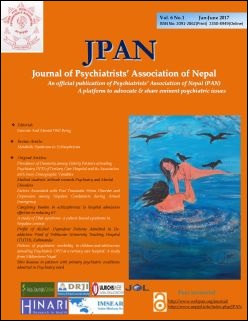Profile of Alcohol-Dependent Patients Admitted in De-addiction Ward of Tribhuvan University Teaching Hospital (TUTH), Kathmandu
DOI:
https://doi.org/10.3126/jpan.v6i1.21771Keywords:
Alcohol Dependence, Profile, NepalAbstract
Introduction: Alcohol dependence is a global problem worldwide and the global burden of disease study published in 2010 concluded alcohol use to be the third leading risk factor for death and disability. This study was conducted to find out the diagnostic profile, socio- cultural determinants, motivation level and other related variables in patients diagnosed as alcohol dependence in hospital admitted patients.
Material and Method: This was a cross- sectional study carried out in patients diagnosed as alcohol dependence and admitted in the deaddiction ward of Tribhuvan University Teaching Hospital over a period of eight months. SPSS version 18 was used for the statistical analysis of the data obtained.
Results: A total of 86 patients were admitted during the period of 8 months. Among those, 48% were admitted with the diagnosis of alcohol dependence- complicated withdrawal while remaining 52% were admitted with alcohol dependence- uncomplicated withdrawal. Assessment of motivation revealed that majority of the patients i.e.43% were in precontemplation phase, 27.9% were in the contemplation phase, 9.3% were in preparation phase, and 19.8% were ready to take action for remaining abstinent. Sociodemographic variables were not statistically significant except for family type where more than 70% of patients with complicated withdrawal belonged to nuclear family when compared to uncomplicated withdrawal.
Conclusion: In this study, we assessed the overall profile of patients admitted with alcohol dependence syndrome in a tertiary care hospital so that this data can be used for better management of our patients.
J Psychiatrists’ Association of Nepal Vol .6(1), 2017, p.38-43
Downloads
Downloads
Published
How to Cite
Issue
Section
License
This license enables reusers to distribute, remix, adapt, and build upon the material in any medium or format, so long as attribution is given to the creator. The license allows for commercial use.




